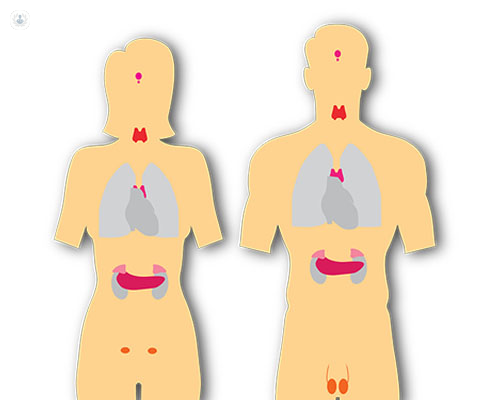Cushing's syndrome: an expert's guide
Written by:Cushing’s syndrome is a condition that occurs when there are too many steroids in your body, usually the hormone cortisol. In her latest article, renowned consultant endocrinologist Dr Rasha Mukhtar explains this condition to us in detail, including its causes, symptoms and treatments.
What is Cushing’s syndrome?
This is a constellation of symptoms and medical issues resulting from too many steroids (glucocorticoids), within the body.

What are its symptoms?
It tends to present slowly over several months or years with symptoms that can be linked to many other diseases. We tend to look for central weight gain (face and abdomen), thinning of the skin, tiredness, hypertension, and the development or worsening of diabetes. Many other symptoms can be associated such as wasting of the muscles in the arms and legs, being prone to infections, and low mood.
What causes Cushing’s syndrome?
There are several possible causes of Cushing’s syndrome. The most common is taking too much steroid medication to treat other diseases for prolonged periods. This is sometimes unavoidable although we now try to use steroid-sparing medication to reduce the effect.

Another cause is the production of excess steroids by the adrenal gland in the body. This can be driven by the production of adrenocorticotrophic hormone (ACTH) from the pituitary gland, or due to a nodule within the adrenal gland producing excess steroids without the body’s usual regulation. In rare cases, Cushing’s can be due to excess ACTH being produced by certain cancer cells. The most common being lung cancer or carcinoid.
How is Cushing’s syndrome diagnosed?
The diagnosis is made by initially running some biochemical tests (blood and urine) to look for excess steroid production and lack of natural suppression. Once this is confirmed we then need to localise where the production is coming from by radiological imaging. This can include an MRI of the pituitary gland, adrenal glands or even the chest.
Can Cushing’s syndrome be fatal?
If untreated Cushing’s can lead to diabetes, hypertension and an increase in cardiovascular risk which in the long term can be fatal.

What treatments are available for Cushing’s syndrome?
The best treatment for Cushing’s is the removal of the causative problem. If it is caused by medication then the aim would be to reduce the steroids to the lowest dose required and substitute them with alternatives if possible. Everyone needs steroids in their body so this has to be done while taking the risk of an Addisonian crisis (a lack of steroids) into consideration.
If the cause of Cushing’s is a pituitary or adrenal tumour then the best option is to have it removed surgically by an experienced surgeon.
Some medications may help control the steroid levels but these are usually used as temporary measures while more permanent treatment is considered.
If you would like to book a consultation with Dr Mukhtar, to discuss Cushing’s syndrome or any other endocrinological concern you may have, you can do so via her Top Doctors profile today.


